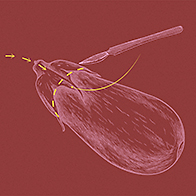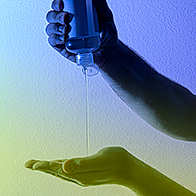My Penis Has a Skin Condition

Redness. Inflammation. Itching. All of this is irritating when affecting our skin.
And if the genitals are affected, the emotional impact can be enormous, said Anthony Hall, a dermatologist with the Male Genital Dermatology Clinic in the Skin Health Institute at Melbourne, Australia, and an associate professor at Deakin University School of Medicine.
Granted, most skin conditions elicit some emotional reaction, Hall added. Eczema is no exception. The term refers to a group of conditions that cause the skin to become itchy, inflamed or have a rash-like appearance, according to the National Eczema Association (NEA).
Hall pointed out that eczema is synonymous with dermatitis, as both refer to inflammation of the skin, or red and itchy skin that tends to result in scratching.
Types of skin problems
The NEA identifies several types of eczema. Atopic dermatitis, a chronic and inflammatory disease related to genetic or personal predisposition to hypersensitive skin, remains the most common type, Hall said. In some cases, it can cover an individual's entire body, affecting the genitals, he added.
"Eczema is like a teenager," Hall said. "It does what it wants to do."
Allergic contact dermatitis is triggered by an allergen, and while it's not the most common type, Hall said it arguably gets disproportionate attention because if you can isolate the allergen, you can remove it and eliminate the problem.
Irritant contact dermatitis is far more common, he emphasized, but can engender a reaction not unlike an allergic one.
"If you wash your hands in gasoline 50 times a day or if you wash your genitals with Lysol, you're not allergic to it—it's just very irritating," said Barry Goldman, M.D., a former chief of dermatology at New York Downtown Hospital who has a private practice in Manhattan. "So the skin will get dry, flaky. It'll thicken up."
In other words, just because the skin turns red and starts to itch doesn't mean you're allergic to those substances.
Sometimes people overcompensate with cleansers after an unsavory sexual encounter, for example.
"Or they'll use a strong soap like Ivory, which is great for detergent, but the thin skin of the genitals can't always tolerate it," Goldman said.
Diagnosing penile eczema
Whatever type of dermatitis you may develop, the diagnosis cannot come from a simple test.
"We do not have a biomarker, and that's why dermatology is a clinical specialty," Hall said.
The area of specialization is germane to the genitals because most diseases of the genitals are, in fact, skin diseases, he noted.
Goldman said the hallmarks of eczema appear basically the same anywhere on the skin.
"It's just, on the genitals, it takes on a psychological importance, and it's hard to function if you're scratching yourself," he said.
Why the scratching? Goldman likened it to a short-lived vacation.
"The itching feels good because it kind of replaces the sensation with pain, and then you get cracks in the skin, which can get infected, and then it sort of becomes a perpetual motion machine, so to speak," he said.
The number-one risk factor for irritant dermatitis and several of the aforementioned conditions is an uncircumcised penis.
To determine the proper treatment, diagnosis is key. But distinguishing different skin conditions on the penis, in particular, is not always easy.
"Psoriasis is recognized easily by dermatologists and easily by nondermatologists, so therefore, it's come to the forefront. Whereas behind all this, irritant dermatitis is far more common, but you won't see that in other statistics and other studies," Hall said, citing an article on the most common conditions, which he co-authored with Joshua Elakis and had published in the Australasian Journal of Dermatology.
Patients or doctors could confuse eczema with candidiasis, lichen sclerosus, lichen planus or plasma cell (Zoon) balanitis, Hall explained.
He said the number-one risk factor for irritant dermatitis and several of the aforementioned conditions is an uncircumcised penis.
When the foreskin is present, the man has an "intertriginous site," Hall said, referring to skin folds, or areas where skin sits against skin. The rubbing of skin on skin, along with greater moisture and heat therein, can result in redness or itchiness under the foreskin and on the glans penis, sometimes extending to the scrotum, Hall said.
"Sometimes [the skin] thickens up, but that's often a reaction to the chronic scratching," Goldman said.
Treatment for penile eczema
In addition to circumcision, which could help prevent or address irritant dermatitis in men with foreskin, other treatment options for penile eczema are available for all men.
If your clothes make you sweat a lot, Goldman suggests simple interventions such as wearing less clothing, changing into shorts when you get home or lowering the room temperature and adjusting the humidity.
You can try removing all irritant factors and avoid using unnecessary hygiene products.
"Sometimes you'll find many [patients] using perfumes, deodorants, baby wipes—all this stuff. We stop all of that nonsense," Hall said.
Both Goldman and Hall cautioned against trying to sterilize the skin.
"Your skin is covered in bacteria, which are part of your, what we call normal flora," Hall said. "So simply wash with a nonsoap wash. Use a moisturizer. The ancient Greeks and the ancient Romans used to use olive oil."
A guy can apply a lubricant such as Vaseline lightly on the foreskin of his penis after showering, or moisturize the penis with coconut oil to obtain some relief, Hall said.
Products with zinc oxide to absorb sweat and secretion can reduce itching, as can vitamins A and D in ointment form, Goldman said.
Both Hall and Goldman agreed that cortisone creams work for eczema on the penis.
"The number-one effective treatment is topical corticosteroids," Hall said.
Using corticosteroids in cream or ointment form twice a day usually clears up the condition within a week or two, Hall said, stressing that contrary to popular misconceptions and conflations with adverse effects related to anabolic steroid use, the treatment is quite safe.
"So on the genitalia, traditionally for eczema or irritant dermatitis, you tend to use a low-potency corticosteroid," he said. "That would be something like 1 percent hydrocortisone."
Doctors sometimes prescribe a 2.5 percent hydrocortisone cream, Goldman said, emphasizing that it is only for short-term use because thinning of the skin is possible. If a patient uses a corticosteroid for a month or two, permanent stretch marks might result.
"It's not as simple as it sounds, like using this cream whenever you're itchy," he said. "Short, prudent, noncontinuous use is what we recommend."
Dermatologists can also use alternatives, such as topical calcineurin inhibitors—pimecrolimus and tacrolimus are the two main types—to treat eczema on the body. But they can be more costly than corticosteroids and don't necessarily offer any advantage, Hall said.
Goldman said antihistamines can be used to alleviate itching and enable the patient to get proper sleep, too.
"Sometimes, rarely, we'll use oral steroids or some other oral medicine that relieves the sensation of pain, in the same way shingles pain is relieved with oral medication or any type of nerve pain is relieved with that type of thing," he said.
Trying to recognize and understand your hygiene routine can be a game-changer.
Some patients opt to use the equivalent of a facial cleanser on their genitals, distinct from what they use on the rest of their bodies, Goldman said. Beyond that, trying to recognize and understand your hygiene routine can be a game-changer.
"What I do is, for people who are in the middle of an eczema outbreak, I try to give them a routine to follow for a few weeks to see if I can break the cycle," Goldman said. "Ultimately, I want them not to have to use anything."
For chronic cases that don't resolve quickly, he said, dermatologists can determine if someone is allergic to an over-the-counter product through "patch allergen testing," wherein a number of common chemicals are applied to a patient's back and then removed after a few days to assess whether any of them caused a breakout.
Don't keep it to yourself
Resolving a penile skin condition comes down to getting an accurate diagnosis. However, embarrassment might keep a guy from asking his primary physician about it.
"They might be concerned it implies an STD that they either got from an encounter or perhaps think their partner gave them," Goldman said. "So it's fraught with discomfort. And urologists are great for urinary problems, prostate problems. Skin rashes are a small part of their training, where for dermatologists, skin rashes are our training."
Urologists and other doctors can help determine whether someone has a sexually transmitted infection (STI) or disease (STD), and biopsies can help rule out those diseases. Once they're ruled out, seeing a board-certified dermatologist to find out what's causing your penile discomfort can prove worthwhile.
"I think, in the end, go and see a dermatologist if you don't get the answers you want," Hall said.




















